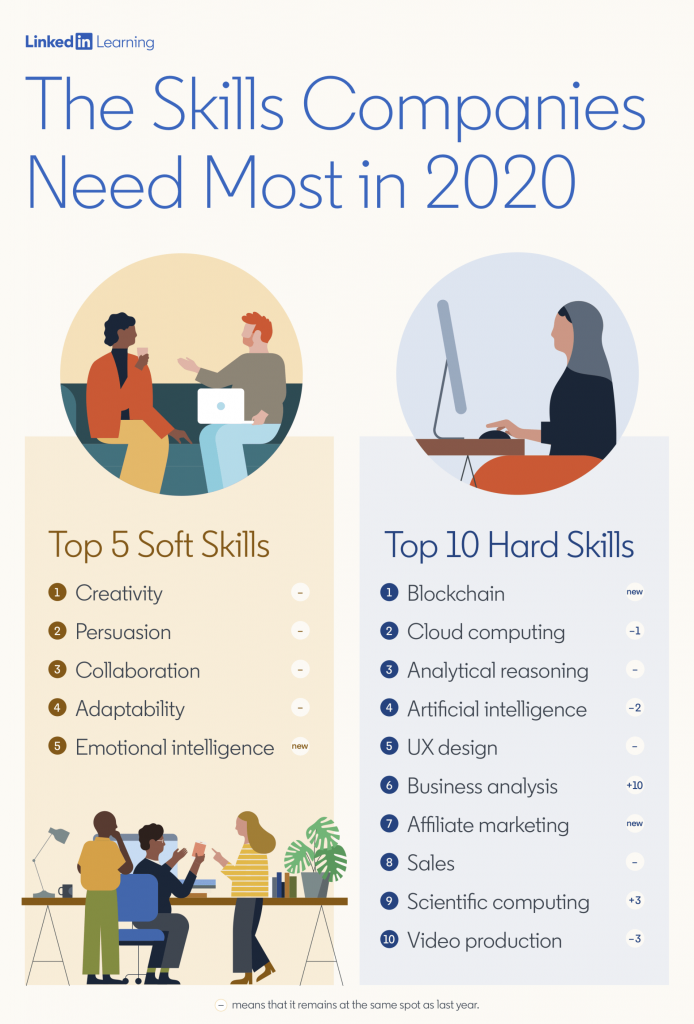Looking to develop your soft skills? Read on to discover the Top 5 most in-demand soft skills you need to grow in 2021.
Professional growth and career advancement hinge on the employee’s desire and ability to learn new things.
Whether you are looking to specialize in your field which means you’d want to go deep, or you are looking to diversify which implies going left and right (learn more about the T-shaped marketer), learning never stops. And it shouldn’t, rightfully so.
Over the past few years, LinkedIn, the 722-million member professional social platform, has been curating a list of the most in-demand soft and hard skills employers are looking for.
Here is LinkedIn’s list for the most in-demand soft and hard skills 2020.

What are the Top 5 soft skills companies look for in their employees and new hires in 2020?
- Creativity
- Persuasion
- Collaboration
- Adaptability
- Emotional intelligence
Let’s talk about each of them.
1. CREATIVITY
Creativity is now the #1 soft skill companies are looking for three years in a row.
Why is creativity in such high-demand?
Listen to creativity expert and BRAND MINDS speaker Denise Jacobs:
Can creativity be taught or is it an inherent trait?
I believe one of the most creative organizations in the world today is NASA. Going into space requires finding solutions to unique problems and even unknown situations. That certainly pushes the brightest minds at NASA to come up with creative and out-of-the-box solutions.
In the 1960s, NASA reached out to Dr George Land, a creative performance researcher and enrolled his expertise in devising a creativity test to help with the selection for innovative engineers and scientists. Dr Land accepted the challenge and devised a creativity assessment that worked very well.
Inspired by the results and curious to know more about where creativity comes from, Dr Land conducted a research study to test the creativity of 1,600 children ranging in ages from 3 to 5 years old. He re-tested the same children at 10 years of age, and again at 15 years of age. And then he extended the testing pool to include 1 million adults.
What exactly did Dr Land test for?
He tested for the ability to look at a problem and come up with new, different and innovative ideas.
Here are the results:
5-year-olds: 98% imaginative
10-year-olds: 30% imaginative
15-year-olds: 12% imaginative
31-year-olds: 2% imaginative
That’s quite a shock, isn’t it?
We are the most creative in our childhood and we lose our creativity growing up.
What is the reason?
Dr Land gave the following explanation in his book, Breaking point and beyond:
What we have concluded is that non-creative behaviour is learned.
Is there something we can do about it?
In his 2016 Tedx Talk, Dr Land says there is a way to undo this process.
Let’s hear from Dr Land (08:37):
First of all, we need to think about creativity beyond artistic abilities.
Artists are not the only creative people.
Professionals in every industry have the ability to be creative. Because in the workplace, being creative means looking at a problem from a different viewpoint and coming up with a fresh solution, as Dr Land explained a few years ago.
It’s not about waiting to be inspired; it’s about thinking creatively.
According to Martin Lindstrom, brand expert and BRAND MINDS speaker, the first step towards creativity is taking time off from your smartphone, observing the people around you and essentially allowing yourself to be present.
2. PERSUASION
In business communication, persuasion is the process of presenting arguments to move, motivate, or change your audience.
Persuasion is one of the most important skills that a leader needs. He has the vision and he sets the goal; he needs to move and motivate his employees to fulfil the vision and meet the goal.
It’s the leader who tells his colleagues Come with me and let’s accomplish the mission together. This is the authoritative leader who provides employees with inspiration, motivation, empowerment and a sense of accomplishment.
Or the visionary leader whose motto is Embrace my vision. This type of leadership is called visionary leadership. The visionary leader must hone his persuasion skills to inspire and motivate people to pursue a long-term vision. Learn more about leadership styles: 12 Leadership Styles for Successful Leaders (complete list) with Pros & Cons.
Persuasion skills are necessary for sales and marketing as well. With a 30-year career researching the science of influence, Dr Robert Cialdini is the world’s most renowned persuasion expert and a BRAND MINDS speaker.
His Theory of Influence is based on seven key principles:
- Reciprocity,
- Commitment and consistency,
- Social proof,
- Authority,
- Liking,
- Scarcity,
- Unity.
Brands build on them to increase brand awareness and sales. Dr Cialdini’s latest insights on persuasion are in his 2016 book Pre-Suasion: A Revolutionary Way to Influence and Persuade.
3. COLLABORATION
We are living and working in a fast-paced environment.
Startups with a handful of employees that work as one are able to move quickly and more efficiently. Corporations with thousands of employees are slow and bureaucratic.
There are many examples of hundred-year-old brands outcompeted by new entrants on the market.
That’s where agility comes into play as a way of organizational transformation with one goal: adapt.
Want to learn more about agility? Read 22 benefits of the agile organization.
For an organization to become agile, its employees must form small teams. Every team member is expected to collaborate with each other. And that’s more difficult than you might think.
To meet the set goals, team members must learn to listen to each other, be supportive, be generous, learn to communicate clearly and openly, share knowledge and information, refrain from judgement, reject bias, debate and adapt.
The team leader must also be an example of effective communication and collaboration.
4. ADAPTABILITY
At the time of writing, the world has been fighting to end the COVID-19 pandemic for almost a year.
Our private and professional lives have been profoundly affected.
Many businesses are fighting to survive while others have already closed their doors. Adaptability has never been more important.
Why are companies looking for employees with a high ability to adapt?
Because these employees are a great asset to the company.
Highly-adaptable employees are:
- Willing to experiment;
- Undeterred by failure;
- Use the failure as an opportunity to learn;
- Resourceful;
- Keep an open mind;
- Have a growth mindset.
5. EMOTIONAL INTELLIGENCE
Emotional intelligence is a new entry in LinkedIn’s Top 5 most in-demand skills of 2020.
Why are companies looking for emotional intelligent employees?
Let’s first find out what is emotional intelligence.
Emotional intelligence is the ability to perceive, evaluate, and respond to your own emotions and the emotions of others. It’s the skill that facilitates and nurtures the other four.
Daniel Goleman, one of the world’s leading psychologists and BRAND MINDS speaker, introduced the concept of EQ or emotional intelligence in his 1995 bestseller, Emotional Intelligence.
According to Daniel Goleman, there are 5 key elements of emotional intelligence:
- Self-awareness;
- Self-regulation;
- Motivation;
- Empathy;
- Social skills.
Employees with high EQ collaborate better, are more adaptable, use persuasion for the right reasons, are motivated and able to motivate others.
The workplace benefits from increased engagement and the business are more likely to find creative ways to stay ahead of the competition.
Join the Conversation
We’d love to hear what you have to say.
Get in touch with us on our LinkedIn Page, Facebook Page, Twitter or TikTok.






















